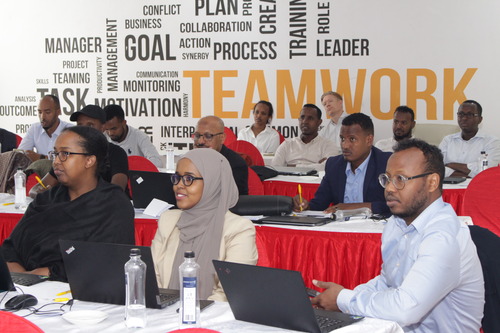Collaboration
Our Approach
“Collaborate” is the first and most essential of the Digital Investment Principles, and it has been at the heart of HADDA since day one. True to this principle, HADDA has prioritized inclusive, transparent, and coordinated collaboration across all levels of the health ecosystem. In complex and fragile settings, collaboration is not just a value—it is a necessity. HADDA’s success in advancing digital health has been made possible by fostering trusted partnerships between government institutions, international actors, researchers, and civil society. The programme actively engages in existing coordination forums and technical platforms, aligning efforts with national priorities while working to reduce duplication and fragmentation in the digital health landscape.
By supporting government leadership and encouraging broad stakeholder involvement, HADDA promotes a model of collaboration where all actors work toward shared goals. This approach ensures that digital investments are not isolated, short-term interventions, but part of a coherent and sustainable transformation of the health information system. The commitment to collaboration has also meant being responsive—adapting the programme to reflect emerging challenges, new opportunities, and insights from partners. This has strengthened ownership, improved alignment, and fostered a sense of collective responsibility for outcomes.

The Swedish Collaboration: Building Capacity Across Borders
A unique aspect of HADDA has been the collaboration between Somali public institutions and three Swedish government agencies—SPIDER (Stockholm University), the Public Health Agency of Sweden (PHAS), and Statistics Sweden (SCB). This partnership brought together technical expertise in digital health, public health surveillance, and data analysis to build capacity within Somalia’s Ministry of Health, the National Institute of Health, and the National Bureau of Statistics.
Together, these agencies co-designed and delivered a series of capacity development workshops focused on data management, visualization, and evidence-based decision-making. The workshops responded to the growing need for data-driven governance in Somalia’s health sector and reflected Sweden’s commitment to knowledge-sharing and long-term systems strengthening. This collaboration has not only strengthened institutional capacity but also demonstrated how peer-to-peer partnerships between public institutions can contribute to sustainable digital development in low-resource settings.
